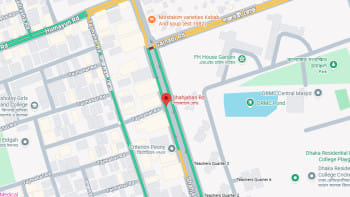Aid access still challenging
Though the Myanmar authorities have agreed to allow the UN to resume food distribution in Rakhine, aid access in the state remains extremely challenging, says the UN.
"Our humanitarian colleagues tell us that aid access in Myanmar's northern Rakhine state remains extremely challenging, with the UN being granted almost no access by the government," Stéphane Dujarric, spokesman for the UN secretary-general, told reporters at the UN headquarters in New York on Thursday.
The international Red Cross movement (ICRC) was able to continue providing assistance in the area, he said.
"However, the needs remain high, with the Red Cross movement aiming to reach more than 180,000 people with assistance by the end of the year. Further humanitarian access and assistance is urgently needed."
Dujarric said the UN secretary-general has called for "full and unfettered access for aid workers in Myanmar, including in Rakhine State, to ensure that all those in need receive assistance.
As a result of the overall limitations on access, the UN could not conduct an independent comprehensive needs assessment in Rakhine, he told journalists.
According to a latest report of US Agency for International Development (USAID), the military operations in Rakhine since August 25 have caused severe food insecurity and mass displacement.
Meanwhile, several hundred more Rohingyas crossed into Bangladesh from Myanmar yesterday. According to the local administration, nearly 700 Rohingyas arrived in Cox's Bazar through Shah Porir Dwip point of the Naf river.
ADDRESS HUMAN RIGHTS CONCERNS
Four UN human rights experts have called upon ASEAN (Association of Southeast Asian Nations) states, including Myanmar, to address pressing human rights issues during the 31st ASEAN Summit being held in the Philippines from November 10-14.
Recognising the important work of many civil society organisations across the region, the experts expressed concern about "a worrying deterioration in the environment in which they operate".
They expressed worries over the rising numbers of cases of serious human rights violations in ASEAN states. They also urged the countries to do more to protect all vulnerable groups, reminding governments that inclusion and meaningful participation are elements of the Sustainable Development Goals.
The UN experts are Special Rapporteur on the situation of human rights in Myanmar Yanghee Lee, Special Rapporteur on the rights to freedom of peaceful assembly and of association Annalisa Ciampi, Special Rapporteur on extrajudicial, summary or arbitrary executions Agnes Callamard and Special Rapporteur on the situation of human rights defenders Michel Forst.
CONCERN OVER TERROR RECRUITMENT
ASEAN defence ministers have voiced concern that Rohingya refugees might be recruited by terrorists. They have urged the ASEAN states to do extra concerning the matter, said Philippines' Secretary of National Defence Delfin Lorenzana, reports InterAksyon, an online news portal of the Philippines.
He was speaking at a programme titled "ASEAN Leadership Amid a New World Order", hosted by the Stratbase Albert del Rosario Institute, at a Manila hotel on Wednesday.
Lorenzana said the matter was amongst a number of considerations raised throughout the ASEAN Defence Ministers' Meeting and ADMM (ASEAN Defence Ministers Meeting)-Plus -- a platform of defense ministers from Australia, China, India, Japan, New Zealand, Republic of Korea, Russia and the USA.
"The consensus was for Myanmar to do more to resolve these issues. Because ASEAN says that the concern of ASEAN is that these refugees might find their way into some terrorist camps and train, and then they will train the other camps in the region, and it will become a problem," the Philippino defence secretary said.
VACCINATION EFFORTS STEPPED UP
An increase in the number of suspected measles cases among the newly arrived Rohingyas and their host communities in Cox's Bazar has prompted the Bangladesh government and UN partners to step up immunisation efforts in overcrowded camps and makeshift shelters close to the border with Myanmar, according to a joint press release of WHO and Unicef released yesterday.
It said nearly 360,000 people, aged between six months and 15 years, among the new Rohingya arrivals in Cox's Bazar and their host communities, irrespective of their immunisation status, would be administered measles and rubella vaccines through fixed health facilities, outreach vaccination teams, and at entry points into Bangladesh.
As of November 4, one death and 412 suspected cases of measles have been reported among the vulnerable population living in camps, settlements, and among the host communities.
As part of stepped up vaccination efforts, 43 fixed health facility sites, 56 outreach vaccination teams and vaccination teams at main border entry points will administer MR vaccine to population aged between six months and 15 years, along with oral polio vaccine to children under five years and TT vaccine to pregnant women.
More than 70 vaccinators from the government and partners have been trained to deliver routine vaccination though fixed sites and outreach teams from tomorrow. The vaccination at the entry points at Subrang, Teknaf has been going on since November 1.
Earlier, Communist leaders from South Asian countries in a statement demanded increased involvement of the UN to ensure "dignified sanctuary" to Rohingya refugees.
"We urge all Communist and workers parties and political forces who support justice to raise their voice against the atrocities and to pressurise Myanmar government to stop brutal sectarian massacre against Rohingyas," reads the statement signed by seven leaders from Bangladesh, India, Pakistan and Sri Lanka.

 For all latest news, follow The Daily Star's Google News channel.
For all latest news, follow The Daily Star's Google News channel. 








Comments